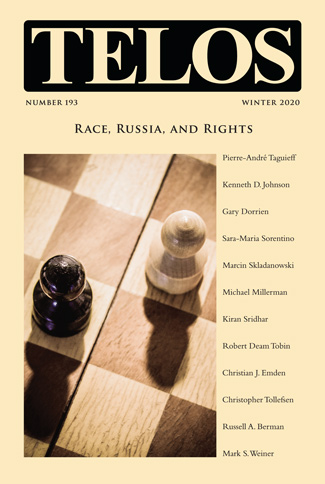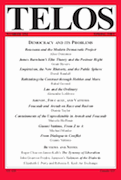By David Pan · Friday, December 18, 2020 Telos 193 (Winter 2020): Race, Russia, and Rights is now available for purchase in our store. Individual subscriptions to Telos are also available in both print and online formats.
 What is not up for discussion? The answer to this question defines a political order, and the repressiveness of such an order will depend on where this boundary is set between the discussable and the undiscussable. But it is not as if more discussion necessarily means less repression. Certain topics—genocide, torture, slavery—definitely need to be off the table as legitimate political measures. Other topics—the choosing of rulers and historical facts—need to be discussable in order to avoid tyranny. In between lies a gray area whose definition will establish the character of each political order. Conversely, a lack of consensus on this issue will lead to political instability that goes beyond the content of political debates, indicating that the question of discussability coincides with the problem of political identity. This issue of Telos will consider three areas in which discussability has become the main issue, leading to implacable conflict. What is not up for discussion? The answer to this question defines a political order, and the repressiveness of such an order will depend on where this boundary is set between the discussable and the undiscussable. But it is not as if more discussion necessarily means less repression. Certain topics—genocide, torture, slavery—definitely need to be off the table as legitimate political measures. Other topics—the choosing of rulers and historical facts—need to be discussable in order to avoid tyranny. In between lies a gray area whose definition will establish the character of each political order. Conversely, a lack of consensus on this issue will lead to political instability that goes beyond the content of political debates, indicating that the question of discussability coincides with the problem of political identity. This issue of Telos will consider three areas in which discussability has become the main issue, leading to implacable conflict.
Continue reading →
By Mark G. E. Kelly · Friday, October 23, 2020 As we near the denouement of the 2020 U.S. general election, the actual in-person one-day ballot—which will surely be less decisive this year than previously, due to the relative prevalence of early voting—Donald J. Trump’s presidency looks doomed. Polling resolutely predicts his demise. Of course, pollsters are cautious this year after almost equally decisive predictions in 2016 proved misguided, and indeed there is still reason to think that Trump might nonetheless triumph (see in particular Isaac Lopez’s recent prediction to this effect in this very blog in his “Why Trump Will Win”).
Trump’s defeat would in a way provide a logical end point to a consistent wailing for his blood from the most vocal sectors of the American public sphere, which began well before he became president. The consistency of the discourse against Trump is nothing short of uncanny—indeed, in some ways it seems unchanged, fossilized, left over from when it was intended to prevent the unthinkable election of Trump from ever taking place. We might read in this determined carrying-on of the rhetorical electioneering of 2016 over the entirety of Trump’s term a kind of denial that Trump’s election ever happened. Indeed, Trump’s election was for urbane liberals so unthinkable that their capitalized “Resistance” to Trump has not been so much a political resistance movement as a reaction of psychological resistance to the very existence of his presidency. From such a perspective, Trump’s defeat might seem to offer a return to sanity and normality, one that will allow “Resisters” to pretend his presidency never happened.
Continue reading →
By Norbert Bolz · Thursday, October 22, 2020 The art of scandalizing is inexhaustible. In Kant’s Anthropology, there are a few remarks familiar to anyone who has studied Kant. According to the standards of the spirit our time, one could characterize those as racist. That media attention can be sparked from this today is known since the leveling of similar accusations at Shakespeare and Mark Twain. Hegel praised war, Nietzsche proclaimed the necessity of slavery, the hypersensitive Walter Benjamin made use of the word “gypsy.” One could endlessly extend the proscription list of scandalous thinkers. For the block warden of thought, there is really not a single great mind before 1968 with whom some racist, militaristic, or misogynistic remark could not be substantiated.
Continue reading →
By Dianna Taylor · Thursday, May 5, 2011 Dianna Taylor ‘s “Countering Modernity: Foucault and Arendt on Race and Racism” appears in Telos 154 (Spring 2011). Read the full version at TELOS Online website.
 This article explores what the works of Michel Foucault and Hannah Arendt reveal about ways in which harm manifests itself within the context of modern societies, and about how the terrain of modernity might be negotiated such that harm is minimized and the practice of freedom is promoted. Focusing on the specific harm of racism, the article examines how Arendt’s account of the rise and function of Nazism in The Origins of Totalitarianism and Eichmann in Jerusalem reflects a concern with key aspects of the modern form of power that Foucault refers to as biopower. Two important points are derived from this analysis: First, Foucault and Arendt see racism, specifically as reflected in Nazism, as paradigmatic of the destructive potential of modernity. Second, Foucault’s and Arendt’s analyses of Nazi racism as a paradigmatic modern harm reflect a critical “counter-attitude” toward modernity. This counter-attitude provides valuable insight into the workings of and harms produced by modern power and thereby facilitates productive negotiation of the modern landscape. This article explores what the works of Michel Foucault and Hannah Arendt reveal about ways in which harm manifests itself within the context of modern societies, and about how the terrain of modernity might be negotiated such that harm is minimized and the practice of freedom is promoted. Focusing on the specific harm of racism, the article examines how Arendt’s account of the rise and function of Nazism in The Origins of Totalitarianism and Eichmann in Jerusalem reflects a concern with key aspects of the modern form of power that Foucault refers to as biopower. Two important points are derived from this analysis: First, Foucault and Arendt see racism, specifically as reflected in Nazism, as paradigmatic of the destructive potential of modernity. Second, Foucault’s and Arendt’s analyses of Nazi racism as a paradigmatic modern harm reflect a critical “counter-attitude” toward modernity. This counter-attitude provides valuable insight into the workings of and harms produced by modern power and thereby facilitates productive negotiation of the modern landscape.
Continue reading →
|
|
 What is not up for discussion? The answer to this question defines a political order, and the repressiveness of such an order will depend on where this boundary is set between the discussable and the undiscussable. But it is not as if more discussion necessarily means less repression. Certain topics—genocide, torture, slavery—definitely need to be off the table as legitimate political measures. Other topics—the choosing of rulers and historical facts—need to be discussable in order to avoid tyranny. In between lies a gray area whose definition will establish the character of each political order. Conversely, a lack of consensus on this issue will lead to political instability that goes beyond the content of political debates, indicating that the question of discussability coincides with the problem of political identity. This issue of Telos will consider three areas in which discussability has become the main issue, leading to implacable conflict.
What is not up for discussion? The answer to this question defines a political order, and the repressiveness of such an order will depend on where this boundary is set between the discussable and the undiscussable. But it is not as if more discussion necessarily means less repression. Certain topics—genocide, torture, slavery—definitely need to be off the table as legitimate political measures. Other topics—the choosing of rulers and historical facts—need to be discussable in order to avoid tyranny. In between lies a gray area whose definition will establish the character of each political order. Conversely, a lack of consensus on this issue will lead to political instability that goes beyond the content of political debates, indicating that the question of discussability coincides with the problem of political identity. This issue of Telos will consider three areas in which discussability has become the main issue, leading to implacable conflict.  This article explores what the works of Michel Foucault and Hannah Arendt reveal about ways in which harm manifests itself within the context of modern societies, and about how the terrain of modernity might be negotiated such that harm is minimized and the practice of freedom is promoted. Focusing on the specific harm of racism, the article examines how Arendt’s account of the rise and function of Nazism in The Origins of Totalitarianism and Eichmann in Jerusalem reflects a concern with key aspects of the modern form of power that Foucault refers to as biopower. Two important points are derived from this analysis: First, Foucault and Arendt see racism, specifically as reflected in Nazism, as paradigmatic of the destructive potential of modernity. Second, Foucault’s and Arendt’s analyses of Nazi racism as a paradigmatic modern harm reflect a critical “counter-attitude” toward modernity. This counter-attitude provides valuable insight into the workings of and harms produced by modern power and thereby facilitates productive negotiation of the modern landscape.
This article explores what the works of Michel Foucault and Hannah Arendt reveal about ways in which harm manifests itself within the context of modern societies, and about how the terrain of modernity might be negotiated such that harm is minimized and the practice of freedom is promoted. Focusing on the specific harm of racism, the article examines how Arendt’s account of the rise and function of Nazism in The Origins of Totalitarianism and Eichmann in Jerusalem reflects a concern with key aspects of the modern form of power that Foucault refers to as biopower. Two important points are derived from this analysis: First, Foucault and Arendt see racism, specifically as reflected in Nazism, as paradigmatic of the destructive potential of modernity. Second, Foucault’s and Arendt’s analyses of Nazi racism as a paradigmatic modern harm reflect a critical “counter-attitude” toward modernity. This counter-attitude provides valuable insight into the workings of and harms produced by modern power and thereby facilitates productive negotiation of the modern landscape. 

